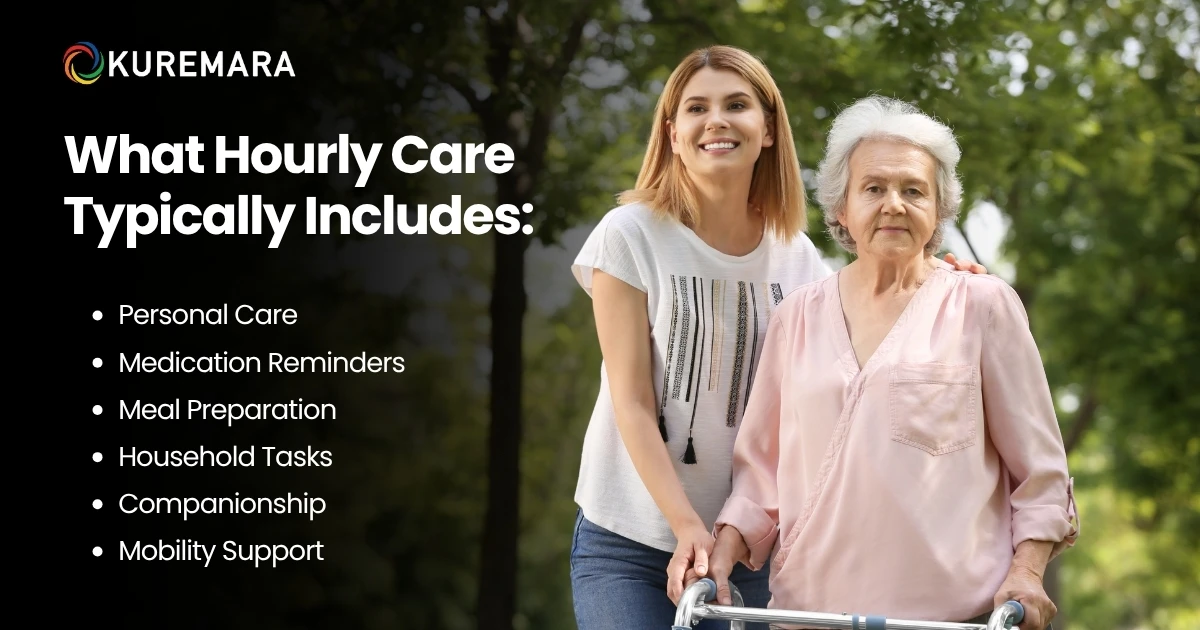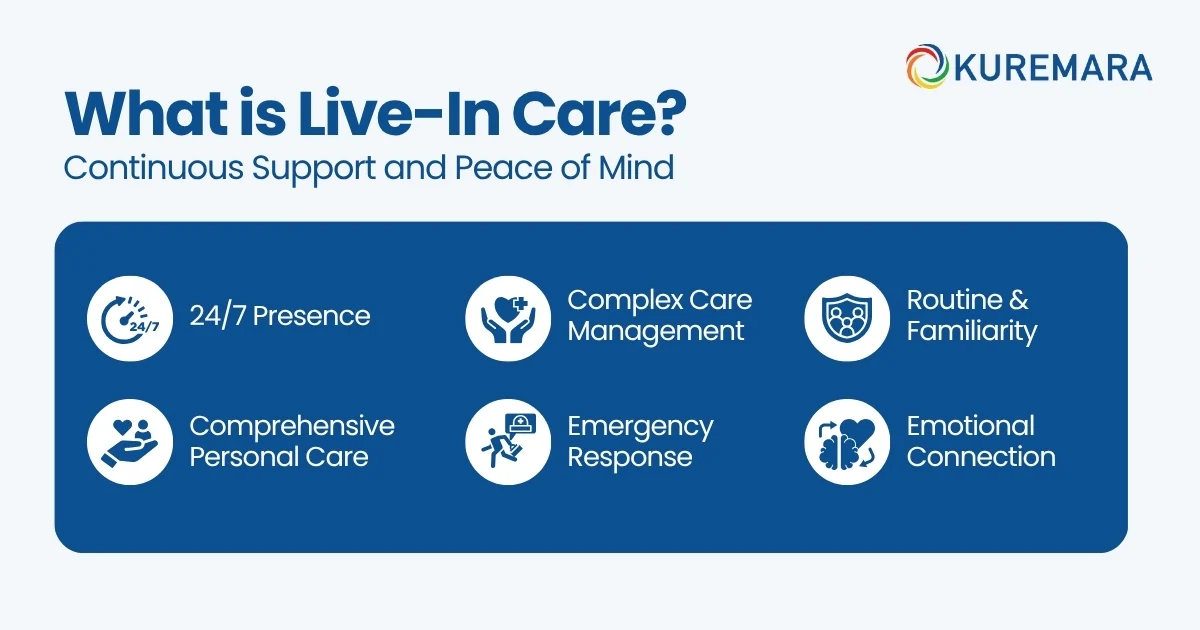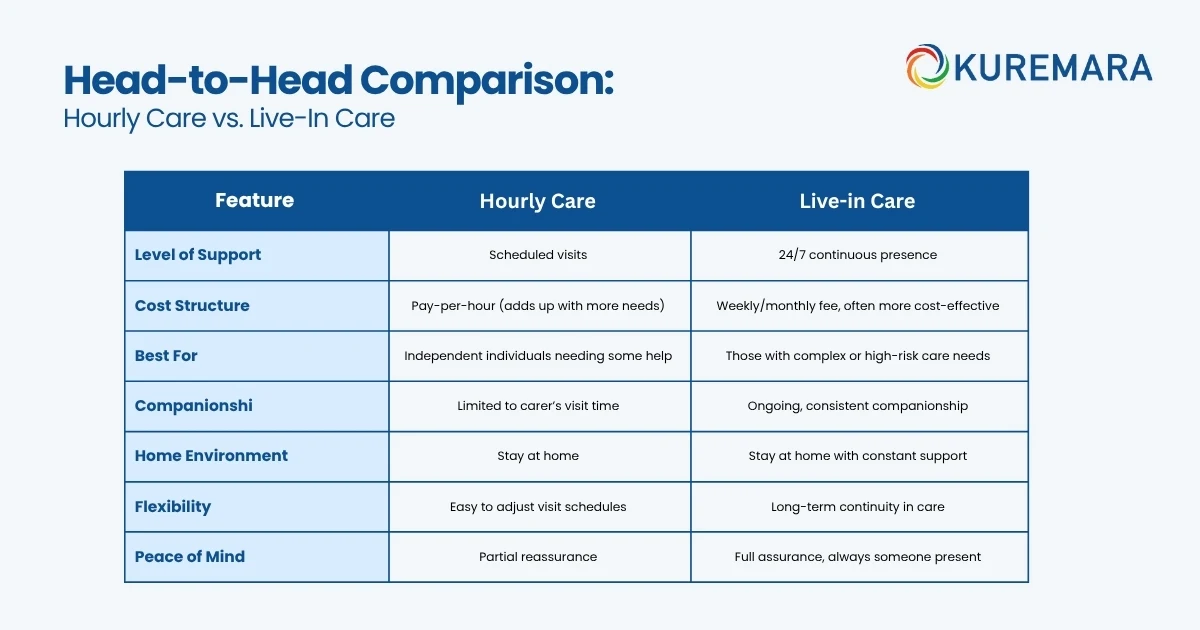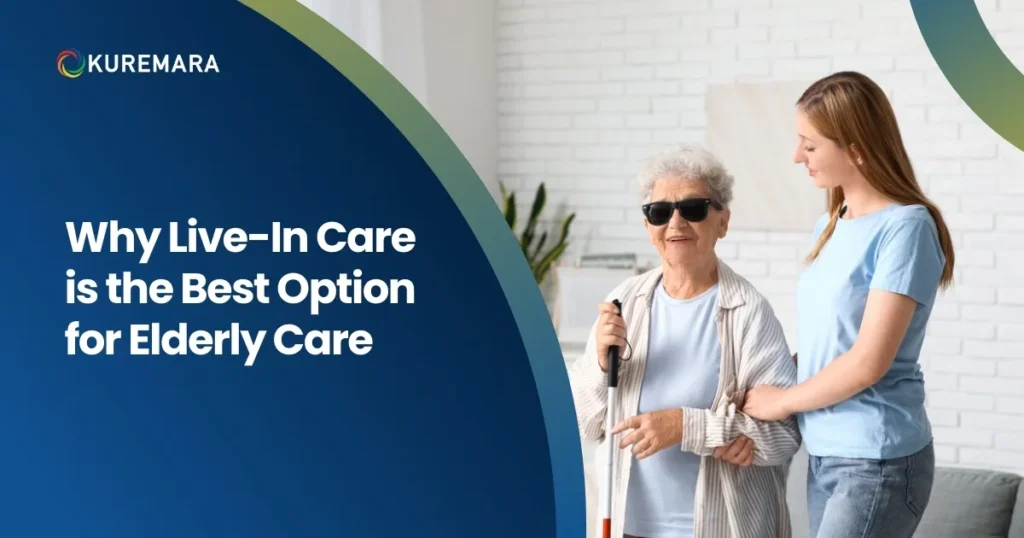
It often starts with small things maybe your mum has begun forgetting her medication, or your father seems more withdrawn and less steady on his feet. These everyday moments raise big questions: Are they just getting older, or do they need more support? And if they do how much is enough?
This is the reality many families across the UK face. Choosing the right care for a loved one isn’t just a practical decision it’s an emotional one. The choice between hourly care and live-in support can feel confusing and overwhelming.
In this guide, we’ll help you break down the differences between hourly and live-in care so you can make the best decision for your family’s unique needs.
At Kuremara, we’ve supported hundreds of UK families in making these decisions with compassion, clarity, and care.
What is Hourly Care? A Flexible Approach to Support
Hourly care, also known as domiciliary care, involves a professional carer visiting your loved one’s home at scheduled times—whether that’s once a day, a few times a week, or several times a day.
What Hourly Care Typically Includes:

- Personal Care: Assistance with dressing, washing, grooming
- Medication Reminders: Ensuring prescribed medications are taken on time
- Meal Preparation: Cooking simple, nutritious meals
- Household Tasks: Light cleaning, laundry, errands, and shopping
- Companionship: A friendly face for chats and emotional support
- Mobility Support: Help with moving around safely
Who is Hourly Care Best Suited For?
- Individuals who are mostly independent but need help with specific tasks
- Those recovering from short-term illness or surgery
- People who need companionship to avoid isolation
- Families providing most of the care but needing respite

What is Live-In Care? Continuous Support and Peace of Mind
Live-in care involves a dedicated carer residing in your loved one’s home, providing 24/7 support tailored to their needs.
What Live-In Care Offers:

- 24/7 Presence: Constant support—day or night
- Comprehensive Personal Care: Bathing, dressing, toileting and hygiene support
- Complex Care Management: Suitable for dementia, Parkinson’s, stroke recovery
- Emergency Response: Immediate help during health incidents
- Routine & Familiarity: Support without disrupting daily life
- Emotional Connection: Companionship that becomes part of daily life
Who is Live-In Care Best Suited For?
- Individuals with complex or high-level care needs
- People living with dementia or chronic conditions
- Those at risk of falls or medical emergencies
- Couples needing different levels of care but wanting to stay together
- Families seeking complete peace of mind

Head-to-Head Comparison: Hourly Care vs. Live-In Care

Key Differences Explained:
- Cost-Effectiveness: While hourly care may seem cheaper initially, it becomes expensive with increased hours. Live-in care offers better value for continuous support.
- Continuity of Care: Live-in care provides consistent support from one dedicated carer, promoting trust and familiarity.
- Emotional Well-being: The companionship in live-in care has a profoundly positive impact on mental health, reducing loneliness and anxiety.
How to Decide: Key Questions to Ask Yourself
Use the following checklist to help determine the best fit:
1. What is the primary reason for seeking care?
- Specific tasks and occasional companionship → Hourly Care
- Safety, chronic conditions, wandering, night-time needs → Live-In Care
2. How many hours of care are needed per day?
- Less than 3–4 hours spread out → Hourly Care
- Morning, afternoon, and overnight support → Live-In Care
3. What is your loved one’s mobility and health condition?
- Occasional help needed → Hourly Care
- Risk of falls, emergencies, complex health needs → Live-In Care
4. Is staying at home important to them?
Both options allow this, but live-in care ensures long-term in-home comfort.
5. What is your budget?
Add up your potential hourly costs and compare with a flat-rate live-in fee.
Why Choose Kuremara for Your Care Needs?
At Kuremara, we specialise in providing tailored hourly and live-in care across the UK. Every care plan is thoughtfully developed by experienced professionals to meet the individual needs of your loved one.
- We are fully regulated and our carers are carefully vetted and trained.
- We believe in matching the right carer to your family—not just any carer.
- You can trust us to offer care that is dignified, compassionate, and responsive.
Let us help you make the right decision—because your loved one deserves nothing less
Frequently Asked Questions
Hourly care involves scheduled visits for specific tasks, while live-in care provides 24/7 support from a carer who stays in your loved one’s home.
Yes, many families start with hourly care and transition to live-in care as circumstances change. At Kuremara, we help you make this shift smoothly when the time comes.
No, live-in care supports anyone with complex or long-term care needs, including younger adults with disabilities or chronic conditions.
Yes, a private room is required for the live-in carer’s comfort and rest. This ensures they can provide high-quality care while maintaining their own well-being.
We conduct in-depth assessments and match carers based on personality, experience, and your family’s preferences. You’ll always have the opportunity to meet and approve your carer before care begins.




